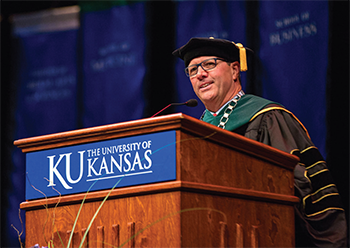
Chancellor Girod speaks to students and faculty during convocation at the University of Kansas.
© Andy White/University of Kansas.
Otolaryngologist Douglas A. Girod, MD, said he’s lucky enough to have had two very successful careers: First, he spent 15 years in the United States Naval Reserve, reaching the rank of Lieutenant Commander and served as vice chairman and research director in the department of otolaryngology at the Naval Hospital Oakland in California; and second, as professor, department chair, senior associate dean, interim executive dean, and executive vice chancellor at the University of Kansas Medical Center. On May 25, 2017, he was announced as the 18th Chancellor, overseeing the university and its roughly 19,000 undergraduates.
Explore This Issue
September 2018We recently spent a few minutes with Chancellor Girod to find out what it’s like to move between careers, how he maintains his clinical practice, and what challenges he sees for otolaryngologists in the future.
ENTtoday: What was your experience in transitioning from the Naval Reserve to a university medical center? Was anything easier or more difficult than you expected?
Dr. Girod: While I was assigned to the U.S. Mercy, the ship was in port and didn’t go out during my tenure. I really was stationed at the naval hospital, which was one of four teaching hospitals in the area. That made my experience much the same there as at KU, as I was at an academic teaching hospital. We received Department of Defense funding for research, and were really able to largely engage in an academic practice.
One of the things that took me to the University of Kansas was that one of my research collaborators from the University of Washington had moved to Kansas. The opportunity to start a head and neck surgery reconstruction program there was appealing. I went thinking I’d probably be there for just four to five years, but I’m still here after 24 years. I’ve found opportunities that allowed me to grow my career without leaving the university.
Otolaryngologists need to be engaged in the design of our working systems, in our political environment, and in what happens in the future of our practices for the benefit of our patients. You can either complain about problems, or be part of the solution. —Douglas Girod, MD
ENTtoday: What has changed the most in your otolaryngology practice since you’ve become Chancellor?
DG: In 2013 I became the University of Kansas Medical Center’s executive vice chancellor, and that’s when my academic role started to impact my practice. I had to significantly reduce my clinical time. Now, I really only see my established patients; I haven’t seen any new patients in the last year.